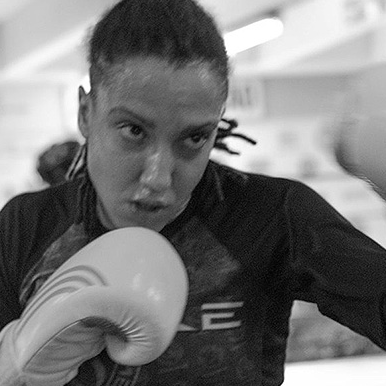The following is a post by our longtime friend, Nico Ball. There's a short
bio after the article and you can also keep track of her on her own blog.
For fighters, confidence can mean the difference between an expertly-timed parry or a too-slow slip that leads to a devastatingly landed blow. Feeling confident is often the difference, ultimately, between raising your hand in victory or hanging your head in defeat. As fighters, we all aspire to a heightened state where each movement is infused with the deadly calm that can only come when self-doubt is shed. While you can’t be taught heart, you can most certainly develop confidence.
photo by Dan Behring
Step 1: Use Positive Affirmation
Do you realize: your mind does not make distinctions between imagination and reality? Thus, your imagination can be a powerful tool for developing confidence (or breeding self-doubt).
Muhammad Ali came to be known for his swaggering presence and his self-proclaimed greatness. While some people may think that he came off as highly conceited, it’s important to consider that the psychological aspects of training and fighting are just as important as the physical. This is why your trainer gives you an aggressive pep talk before you step to ring center. Positive affirmation is a powerful way to build confidence and allay doubt.
Fighters should always approach training and competing with a positive attitude and a strong mental state. Failing to do this, will set the fighter at a disadvantage before even entering the ring. A strong deep-seated conviction about the outcome of any action will inevitably impact the results of said action. That’s why sports psychologists advocate for the use of positive self-affirmations and visualization techniques to help athletes bolster their mental swagger.
So the next time you find yourself facing a difficult endeavor, like a big fight, use your mind to practice what you need to do to succeed. By putting your mind to work in this way you’re taking a big first step towards fighting confidently.
Step 2: Practice Repetition, Practice Repetition
Confidence leaves room for the audacity of original thought. Therefore, a fighter should train until confidence in the face of adversity becomes reflexive. The act of repetitively drilling a single movement or technique until it becomes embedded into your very being frees your mind to focus on the more dynamic, technical aspects of fighting and makes it easier for you to feel confident.
Various acts, like punching, blocking, and parrying, should become as natural as breathing to a fighter. The basic mechanics of fighting should not be bogging down a fighter’s mental process. Through repetitive drills the fighter will eventually become more at ease. Controlled movements, relaxed posture, and calm in the thick of battle are all elements of a confident fighter that can make an enormous difference in the judging of a bout.
Repetition in training does not mean just going through the motions in a rote mechanical fashion. Being mentally present during training and pushing one’s self to the limits day in and day out is essential to improvement. If you never push your threshold and rarely perform outside of your comfort zone, then you will always be fighting reactively and limiting your ability to grow confident.
It is important to set goals, mark progress, and ultimately, test yourself. It is the process more than any outcome that will shape the athlete and grow confidence.
Step 3: Confidence in Competition
Okay, so not every athlete who puts on a pair of boxing gloves does so with the expectation of entering the ring, but whether it’s sparring or an actual contest, competition not only allows athletes to check progress and modify training routines in order to maximize gains, it tells them a lot about who they are as people. By testing one’s self outside of the usual comfort zones, a fighter is able to shed false pretenses while simultaneously gaining self-knowledge and a better understanding of her true abilities.
An athlete must be able to overcome a fear of failing, whether that means stepping into the ring or just stepping onto a scale. It is only by confronting this fear time and again that one can develop the habit of facing challenges and the fear of failure with a sense of confidence.
Competition should not be confused with comparison. It’s not about comparing progress with others; the idea is to confront individual fears and limitations. By constantly confronting and testing limitations in competition both inside and outside of the ring, athletes are able to embrace new challenges with confidence whether the result is satisfactory or devastatingly contrary to the desired outcome.
In the end, confidence boils down to a fighter’s faith in her ability. Not just to win, but to learn and evolve as an athlete. A fighter’s willingness to work continuously, not just in order to achieve the desired results, but also to learn from the process itself, is essential in building confidence.
Dan Behring
Nico Ball recently left her life as a teacher to train mixed martial arts full-time in Brazil. Originally from Pennsylvania, she attended George Mason University in Virginia and received her Masters degree studying the impact of martial arts-based social projects. She’s now living the fighter’s life and pursuing her dream to become a pro mixed martial artist.
Additionally, Nico has found a way to continue her interest in creating social change by helping organize The Tererê Kids Project, a nonprofit for the children living in poverty in the favela of Morro do Contagalo. You can keep up with Nico through her blog as she trains and competes in MMA, Muay Thai, and Boxing alongside one of the world's fastest growing female fight teams, Parana Vale Tudo (PRVT).


